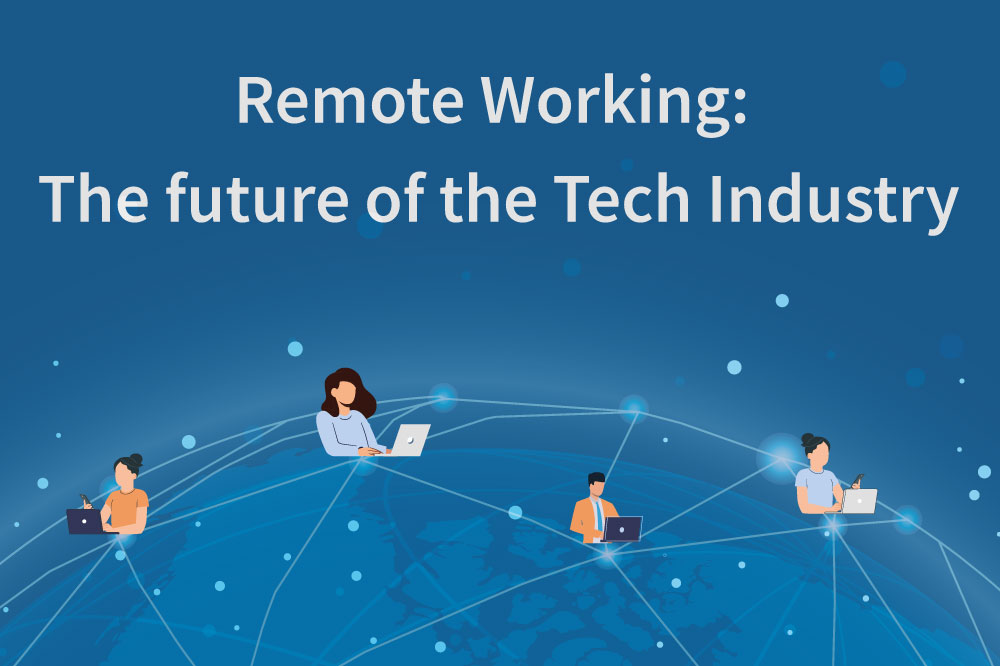Remote Working: The future of the Tech Industry
Before the pandemic, work-from-home, remote work, agile teams were an unfamiliar concept to most IT firms. With the Covid-19 pandemic restrictions the world was pushed to pause and offices had to reimagine how they could still make the most of it. People quickly adjusted working from their homes without compromising productivity. However, still many companies are not a fan of the work-from-home approach. Despite the reasons this major shift by both companies & employees are opening up new opportunities to connect beyond borders while learning through mutual experience. Unfettered by the so-called hurdles, tech giants like Twitter, Facebook, Siemens, Google and Shopify have already announced that a significant part of their workforce would be permanently allowed to work remotely. According to the recent surveys the percentage of remote workers has doubled to 41.3% post-pandemic. With remote work creating new opportunities & opening a choice for employees, it is crucial to understand what makes remote work a hit and what the future of this remote working culture looks like.

What makes Remote working a Hit among the IT giants?
1. Productivity is key
Enterprise Technology Research (ETR), a U.S. based technology market research firm, surveyed about 1,200 CIOs (Chief Information Officers) across various industries in the globe. They stated that 72% of their total global workforce is currently working remotely. 48.6% of the CIOs reported that productivity has improved since the remote work culture began, with only 28.7% CIOs indicating a decline in productivity.Large productivity boosts were reported by the IT divisions in telecommunications, financials and the insurance sector. But energy, utilities, and education sectors are among the other fields who did not find the remote working trend very appealing.For companies to experience large productivity, they should keep in mind a few factors that include recruiting the right workforce, team communication and bonding, and access to tools and technology. They should also strive to meet the needs of remote workers to maintain high-quality work performances.
2. Leveraging the right Technologies
With the rise of technology and cloud-based management platforms businesses aim to help remote teams collaborate seamlessly. Some examples include Asana, Basecamp, Microsoft Project, Smartsheet etc. With tools like Google Drive and Dropbox, each team member would be able to collaborate, share information, and access data whenever and wherever they need to. There are various tools and apps to manage time that help calculate time zone differences by taking into account Daylight Saving Time (DST). Google Calendar allows scheduling meetings and appointments in different time zones. Leveraging technologies as such has enabled remote work preferable by both employers & workers. Companies must also invest in tools that will help them manage, monitor and motivate their remote teams to experience higher productivity.
3. Remote work culture: Apt for upcoming younger talents
The remote work culture has become a hit among the younger generations like millennials and Gen-Zers. That is because young talents are looking for a more flexible option when choosing their careers as opposed to the traditional 9-5 office jobs. Young employees dream of working while traveling the world without restrictions on location and time. Remote hiring also creates a whole wide platform for the business HR and recruiters to acquire some of the world’s top young and dynamic talents who were skeptical about relocating to bigger cities. But hiring remote talents requires well-designed screening processes. Our Centizen Talent Hub service simplifies the whole process of hiring borderless talents by saving businesses from all the time-consuming vetting process. We custom design the whole hiring process according to the expectations of hiring managers and the challenges faced by the Talents.
4. Work-Life Balance
With proper barriers set, remote work gives new meaning to work life approach with a certain degree of freedom. Especially for primary caregivers to their parents or kids, this work culture would give a lot of time to spend with family. This would in turn improve employee well-being and reduce stress levels. Moreover, employees can dedicate some time for health practices. Remote working seems to help people set boundaries and practice self improvement in all walks of an individual’s life.
5. Access to the reservoir of global talents
When businesses decide to hire remotely, they have an opportunity to hire across various locations, time zones and countries. There are a lot of people who are competent but are unsure about relocating to other countries due to personal reasons. Remote hiring can tap highly talented senior developers at relatively low wages. Collaborating with staffing partners, finding talented, skilled and culture fit employees may be a breeze. Hiring remotely may reduce the competition with the local companies in your region to pick the best talents.
6. Autonomy means more innovation
Teamwork is about assigning work and trusting your team member to handle it should conflicts arise and get it done without having to micromanage them. If you want to hire great talents and retain them, you have to let them work in a way they can attain their true potential which offers growth. Each employee should be given the freedom to express his own ideas and make a way to implement them. After all, ideas are the driving force for any business. Businesses are run by ideas, not hierarchies. Remote working gives the teleworkers a lot of flexibility in terms of time and location. This means they are less distracted and dominated by the people at the top of the hierarchy. So this means more innovation and less resistance to implementing one’s own ideas.
7. Cost-effectiveness
Remote hiring cuts expenses on office rent, supplies, internet connection, printers, electricity and so on. Until a candidate onboards it does cost time, effort and resources for the business. To cut down on these costs, you can take the help of staffing solutions like Centizen Talent Hub. This ensures the hires are equipped to get their assignment done. The IT employees in developing countries earn less as compared to their counterparts in the U.S. where a software engineer earns a gross salary of $95,744 annually. So businesses in developed countries can reduce their operational cost by hiring remote talents. While the talent pool gets to be a part of global companies and upskill themselves to match with the growing technology, employers get access to highly qualified professionals at a much lower cost.
Final Thoughts
Remote work culture opens borders and new experiences as people from different walks of life come together to work on the same project. Remote Working, once considered less productive, has become the new norm this post-pandemic and is here to stay for the better. To make it a more successful practice, organizations must up their game by facilitating remote work whenever possible. Get guidance from acclaimed staffing partners like Centizen Talent hub to hire best talents across the globe, for your business.
Centizen
A Leading IT Staffing, Custom Software and SaaS Product Development company founded in 2003. We offer a wide range of scalable, innovative IT Staffing and Software Development Solutions.
Contact Us
USA: +1 (971) 420-1700
Canada: +1 (971) 420-1700
India: +91 63807-80156
Email: contact@centizen.com
Our Services
Products
Contact Us
USA: +1 (971) 420-1700
Canada: +1 (971) 420-1700
India: +91 63807-80156
Email: contact@centizen.com






